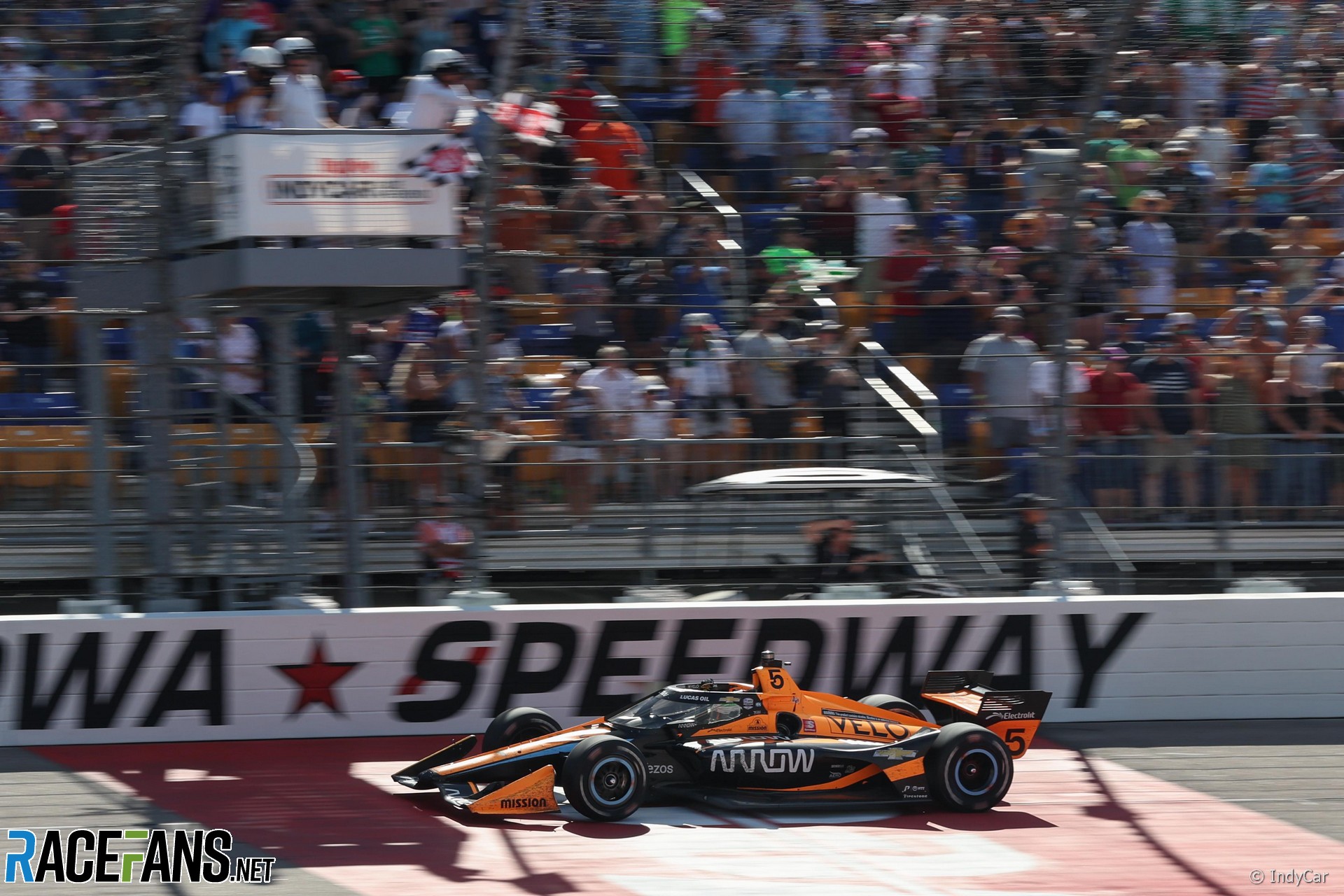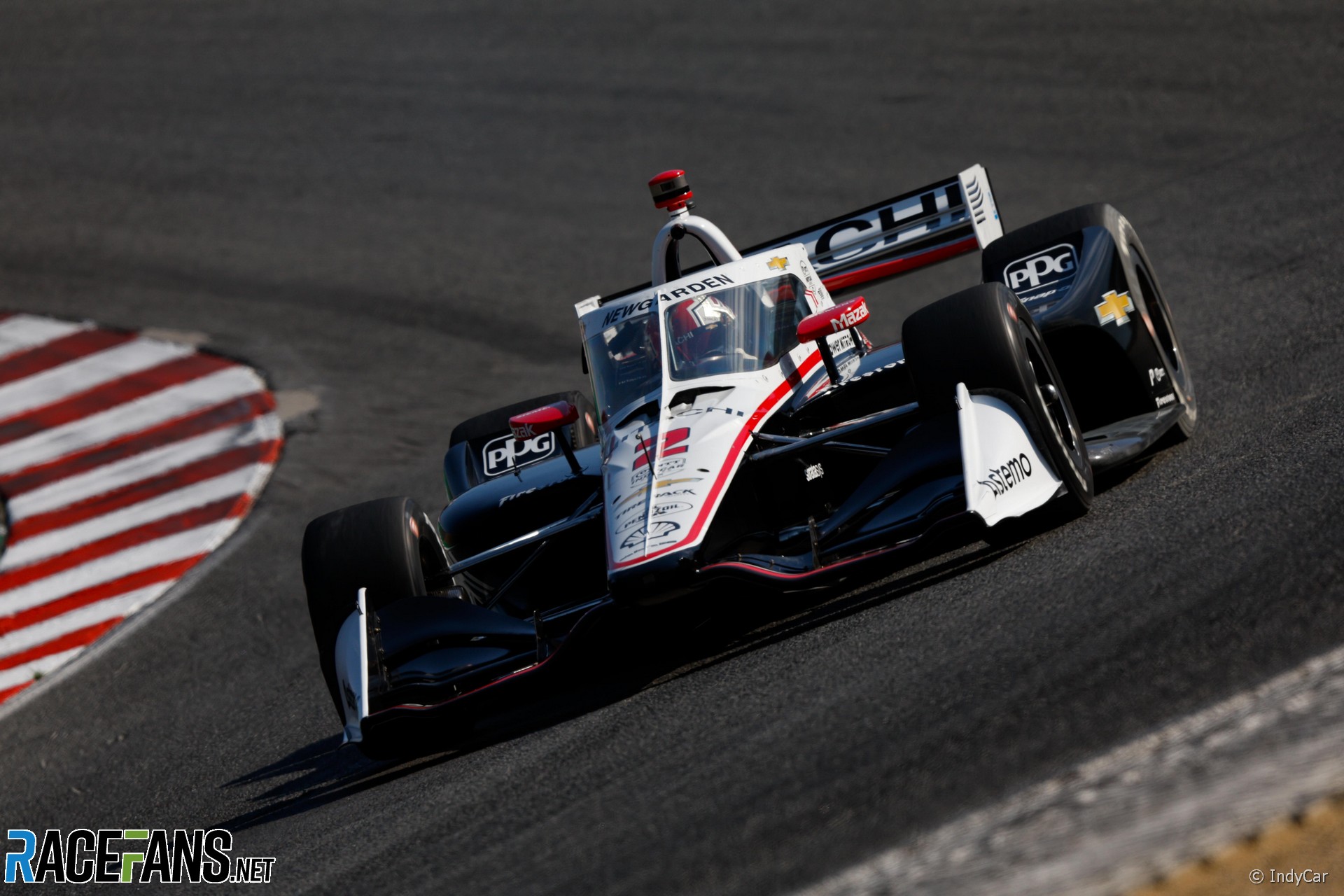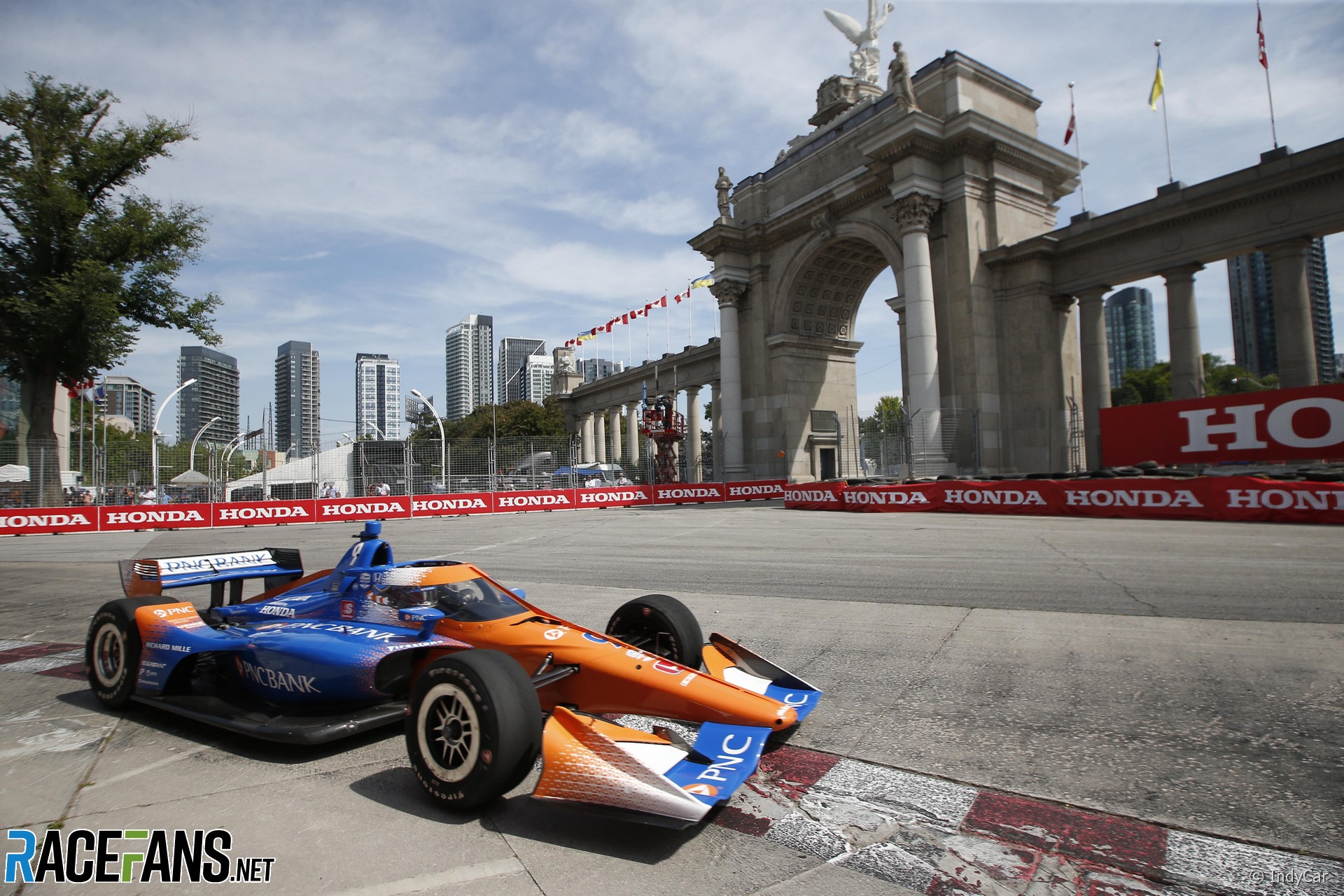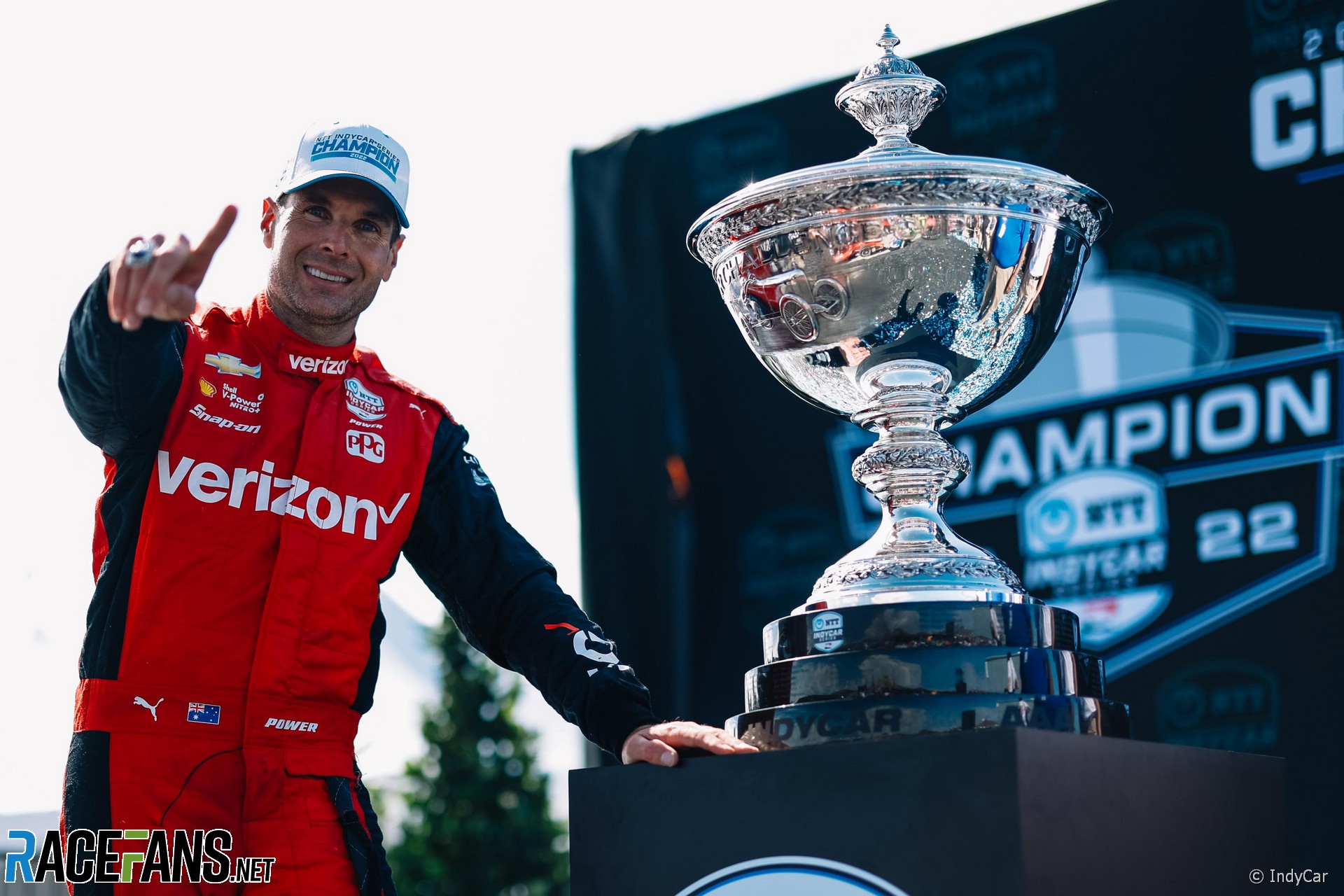5 – Scott McLaughlin – Penske
Meet IndyCar’s newest elite driver.
Last year, Scott McLaughlin won Rookie of the Year honours over Romain Grosjean solely because Grosjean voluntarily stood down from three races. Save for some flashes of strength at ovals, McLaughlin looked very ordinary in a high powered single seater, far away from his sensational form in the Australian Supercars Championship that he’d left behind after a hat trick of consecutive titles and a Bathurst 1000 victory.
However, during the off-season, McLaughlin transformed into a top-tier IndyCar driver – albeit with the help of the cache of resources he has at Penske. He converted his maiden pole into a sensational victory at the season-opener in St Petersburg, thwarting reigning champion Palou. Then he was one corner away from doubling up at Texas Motor Speedway.
He defeated Palou again at Mid-Ohio to bust a slump, and at the end of the year, he never finished worse than sixth in the final six races – including four podiums, another pole in Nashville, and a dominant pole-to-win victory in Portland.
All this from a driver whose entire junior formula career before IndyCar was but a single season of regional-level Formula Ford racing. The only thing that kept him from finishing higher than fifth in the points was a late spring slump that included spins at the Indy GP and Detroit, and a crash out of the Indy 500. But the proof of concept is real, and ‘Scotty Mac’ will be expected to fight and tumble his way to many more victories next season and beyond.
Advert | Become a RaceFans supporter and
4 – Pato O’Ward – McLaren SP
When Pato O’Ward has the car under him, there are few, if any, more electric young drivers on the IndyCar grid than the 23-year-old ace of the McLaren SP IndyCar team, with his lightning-quick ninja reflexes and blistering speed.
It was a close seventh for O’Ward at the end of the season, but not because he had fallen off from his third-place championship finish in 2021. If anything, he was bitterly unlucky not to have matched or surpassed that high mark. He drove sensationally to get by Rinus VeeKay and snatch victory at Barber Motorsports Park, and the misfortune of Josef Newgarden allowed him to capture his second win in the Iowa 300 after finishing second the day before.
O’Ward said he didn’t have the horsepower to pass Ericsson on the last lap of the Indianapolis 500, but one can argue that he could have been more committed to what could have been a sensational around-the-outside overtake into turn one – and would have his name and likeness on the Borg-Warner Trophy instead. By then, O’Ward was second in the standings, but then suffered back-to-back mechanical failures at Road America and Mid-Ohio, the latter after leading the opening stanza from pole. He was officially eliminated from title contention at Portland, but getting swept up in a Nashville pileup to end the race was the symbolic end of his title hopes.
And all of this came with off-track discord. There were rumblings of O’Ward being discontent at McLaren. His victory at Barber got him a new three-year contract, but then the Palou pre-contract drama unfolded around him and left some to speculate if O’Ward was regretting his decision to stay. Now part of a three-car team for 2023, O’Ward is expected to be back in the forefront of the Astor Cup chase.
3 – Josef Newgarden – Penske
For the third straight season, the favourite son of Hendersonville, Tennessee finished second in the IndyCar Series standings. He fought back from a mistake in qualifying at Laguna Seca to charge from 25th to second place at a track where overtaking is at a premium. It was quintessential Newgarden.
His five wins in 2022 were the most in a season since Simon Pagenaud won that many en route to his 2016 championship. He won back-to-back in Texas and Long Beach, then took a sponsor’s million-dollar bonus by winning at Road America. A season of peaks and valleys hit its climax in the Iowa Speedway doubleheader: He crushed the field in the 250 lap race on Saturday, was poised to do the same the following day in the 300 lap race – then his suspension failed and pitched him into the wall, out of the race – later collapsing outside his motor home and taken to hospital.
He held off a hard-charging David Malukas for his fifth win at Gateway, and entered the Portland weekend just three points back from Will Power – where he opted for one stint too many on the harder, primary tyres and dropped to eighth when at least a top-five finish was on the cards.
Newgarden became the first driver in eleven years to win more than five races in a season, and lose the series championship anyway. But one would be hard pressed to bet against him finally getting that third series title in 2023. He’ll also be chasing down an elusive first Indy 500 victory in what will be his 12th try.
Advert | Become a RaceFans supporter and
2 – Scott Dixon – Chip Ganassi
Just one, single mile-per-hour of speed cost Scott Dixon every major honour in 2022.
‘The Iceman’ was just one of a few serious title contenders this season, but he was making the most of his given opportunities. After eight top-ten finishes in the first nine races and a podium in Detroit, Dixon drove to victory in the streets of Toronto. Some are still trying to figure out how Dixon escaped terminal damage after being collected in a multi-car pileup halfway through another chaos-strewn race in Nashville, then went on to fend off Scott McLaughlin in a photo finish for his second win of the season.
He only finished outside the top ten twice all season, including at Laguna Seca, where he just didn’t have the speed all weekend to contend for victory. But he wouldn’t be in a position of weakness heading into the decider if not for a small, costly error at the Indianapolis 500.
Dixon broke a 26-year-old record for the fastest official pole position run ever. He led more laps than any other driver not just on the day, but in the history of the race. Then, he went one mile-per-hour over on pit entry, which resulted in a drive through penalty and a 21st place finish – and another near miss with a second Indy 500 win, and eventually, a missed opportunity for a record-equalling seventh national championship. Even in the sunset of his Hall of Fame-calibre career, Dixon should be poised to fight for victories and a championship. But if 2023 turns out to be the beginning of the decline, we may look back on 2022 as the year where one mile-per-hour cost Dixon his best and last shot to build upon his sensational record.
1 – Will Power – Penske
Will Power’s ceiling going forward into 2022 was clear-cut. He hadn’t been a serious championship contender for a few years, he was past his 40th birthday and likely on his last full-time IndyCar deal. Maybe he’d get a win or two somewhere, but nothing more.
Power has always been one of IndyCar’s most intense and uncompromising drivers, but in the off-season he transformed his mindset. He wouldn’t be bothered by what he couldn’t control, and while he would still give his all at every weekend, he would be content with picking up points and strong finishes on days where victory wasn’t in the cards. If one was cynical, they saw ‘Will Power: Master of Zen’ as nothing more than a thin facade that would wear down before the first bit of adversity turned him into a miserable malcontent. The post-race brush against Devlin DeFrancesco at Road America, after the rookie punted Power out of contention, was arguably the one sign where that new attitude would crumble – but there was no lasting vitriol.
He had only won close victory this year, when he held off Rossi to win the last Detroit Grand Prix in Belle Isle from 16th on the grid. But his nine podium finishes led all drivers – if you flipped a coin, you’d have less of a chance of it landing heads or tails than Will Power had of finishing in the top three this season. He captured five poles to surpass Mario Andretti’s long-standing record for the most in the history of major American open-wheel racing.
In my view, the moment that was synonymous with the ‘new’ Will Power was Mid-Ohio. Already starting down in 21st, Power was spun around on the opening lap after contact with Takuma Sato and dropped to the rear of the field. On the same day that Andretti plunged into intra-team turmoil, Power collected himself, benefited from a three-stop strategy, and fought back to finish in third place. He averaged better than a sixth-place finish for the season, despite a poor Indy 500 result, for his second IndyCar Series championship that many assumed would never come.
Advert | Become a RaceFans supporter and




















